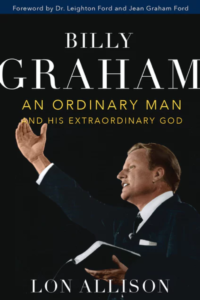Just in time for the first anniversary of Billy Graham’s death, Allison’s reflection on the life and work of America’s pastor is now available in paperback.
This week’s blog feature the new preface by the author, new to this edition.
—
Surprise, surprise, surprise.
Between the time my biography of Billy Graham first appeared in April of 2018 and now, as we are preparing to release the paperback version, I’ve been more than a little surprised at how many people have Billy Graham stories on the tip of their tongues. Many, many people have shared their stories with me. In almost every case, a story includes the storyteller’s surprise that they felt as if Billy were a brother or a friend to them. The common denominator in the stories seems to be his kindness, his graciousness, his easy familiarity. Mr. Graham, or Bill as he preferred being called, made friends everywhere. This aspect of his personality comes through in my book, I hope, but I choose to emphasize it in this preface because it’s an uncommon trait in CEOs of large nonprofits and corporations.
Billy was the founder, CEO, and Chairman of the Board of the Billy Graham Evangelistic Association throughout eight decades of active ministry. Such leaders are usually noted for their vision and focus on the goals of the organizations they lead. They are usually no-nonsense, organization-first people. They have appropriate interpersonal intelligence, as well. But they aren’t generally friendly in the sense of seeming to genuinely care for the people they meet or who work for them. My read on Mr. Graham through the testimony of many, and my own story of knowing and working with him, was that he was an exception to the stereotype. People were not afraid to work for him and alongside him; they did not fear his criticism. Rather, they worked for him because he honestly seemed to care about their well-being. This created a loyalty, not only in his organization, but with hundreds of other Christian groups with whom he partnered. It is appropriate to suggest Billy led not only his own ministry but the rise of Evangelicalism for decades because of his affection as well as his vision.
A caring leader creates a contagion of caring and loyalty. I found the same level of friendliness and genuine care in his closest friends and co-laborers. Cliff Barrows, Sterling Huston, David Bruce, Tom Phillips, and a host of others within the Billy Graham organization displayed such care for me when I was first brought into the Association orbit in late 1998. Those friendships still exist, except where my old colleagues and friends have passed on to glory. I watched them do the same with scores and hundreds of other people. Like leader, like team. It was a rare and beautiful part of Billy Graham, and he passed it on to others.
When I was stepping aside from leading the Billy Graham Center at Wheaton College in late 2013, I received a call that said Mr. Graham wanted to see me. He was ninety-four at the time and living a somewhat reclusive life in his home in Black Mountain, North Carolina. His health was deteriorating and his faculties were declining. I flew in from Chicago, and under the guidance of David Bruce, Billy’s executive staff leader, I went to visit Billy one last time. I wasn’t sure he’d remember or recognize me since my fifteen years of work was done outside of his headquarters a thousand miles away. When I sat down in a chair next to him in his wheelchair he said something to the effect of, “Lon, I wanted to see you one more time and say thank you for your leadership at the Graham Center.” I remember responding, “Mr. Graham, I’m sorry I didn’t do more, I’m sorry. . . .” He cut me off mid-sentence. Then, with eyes looking directly into mine no more than three feet away, he said, “No, I have followed your ministry and know what you’ve done and I thank you.” I’ll take that encouragement with me to heaven.
Mr. Graham would not wish me to end this thought about his genuine affection and appreciation of people without saying that anything he was that was beautiful and memorable was because of Jesus Christ, his Lord. Jesus is a friend of sinners, quick to forgive and abounding in love for all. Billy mirrored that a bit because God’s Spirit dwelt within him. He would also say that Jesus is ready at every moment to receive all who call on him to become their friend, forgiver, and Lord forever. If you’ve not done that, my prayer is that this book will convince you to do so.
I conclude this preface by thanking several people who were instrumental in helping with this book. David Bruce and Tom Phillips from the Graham organization were multidecade eye witnesses of the work and life of Billy Graham. They were gracious to support this effort and give me guidance and stories. I also want to thank my writing group, the Mead Men, who listened, suggested, and corrected the manuscript. Wheaton Bible Church graciously gave me the time to do the work. Finally, my deep thanks to the Publisher of Paraclete Press, Jon Sweeney, who became a devoted and tireless editor and helper of the project. In the final month of research and writing I was diagnosed with liver cancer. Jon’s prayers and encouraging words, and the graciousness and hard work of his staff will never be forgotten.
—LON ALLISON, West Chicago, Illinois

